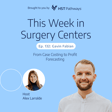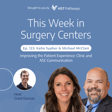Podcast Introduction and Format
00:00:01
Speaker
Welcome to This Week in Surgery Centers. If you're in the ASC industry, then you're in the right place. Every week, we'll start the episode off by sharing an interesting conversation we had with our featured guests, and then we'll close the episode by recapping the latest news impacting surgery centers. We're excited to share with you what we have, so let's get started and see what the industry's been up to.
00:00:27
Speaker
Hi, everyone. Here's what you can expect on today's episode.
Common Deficiencies in ASCs
00:00:31
Speaker
Deborah Stichcomb is a senior consultant for Progressive Surgical Solutions, and she's on the podcast today to talk to us about the common deficiencies she typically finds ASCs struggle with during a patient tracer exercise. With 30 years of experience, Deborah has seen it all, and she's sharing excellent tips to make sure ASCs pass this part of the accreditation process with flying colors.
00:00:55
Speaker
In our news recap, we'll cover social media do's and don'ts for surgery centers, how anesthesia start times can impact your bottom line, a new groundbreaking surgery center in Uganda, and of course, end the new segment with a positive story about the power of music in a hospital. Hope everyone enjoys the episode and here's what's going on this week in surgery centers.
Deborah Stichcomb's ASC Experience
00:01:23
Speaker
Hi, Deborah. Welcome to the podcast. Thank you for joining us. You bet. Absolutely. Before we get started, can you tell our listeners a little bit more about yourself?
00:01:33
Speaker
Well, I've been in the ASC industry now for almost 30 years, which is kind of scary to say. I've been the administrator of a couple of centers. I've also been in the RVP role for a couple of corporate entities. And I've been doing consulting now since about 2012.
00:01:53
Speaker
And I've been blessed to be on, or I've been lucky to be on the FOSSA board in the past, as well as the ASCA board. I've been a Triple-HC surveyor. I have chaired the Joint Commission PTAC, and I'm currently the treasurer for BASC, which administers the certification for administrators, as well as CAIT.
00:02:16
Speaker
Wow, that's extremely impressive. What has been your favorite role to date? Could you pick? Gosh, all of them are.
00:02:27
Speaker
Most fun as far as outside of the work area is to just help people with running their surgery centers and educating them and educating their staff. That's been very rewarding. Yeah, I bet. That's awesome. And how about progressive surgical solutions? Tell me a little bit more about the organization. How many AICs do you work with? All that good stuff. Absolutely.
Progressive Surgical Solutions Services
00:02:50
Speaker
We have been around since about 2010.
00:02:53
Speaker
About four years ago, we merged with BSM and they are a practice management company, so there was a lot of good synergy between the two. We do everything from doing a pro forma in a development project to helping with floor plans, licensing, certification, accreditation.
00:03:14
Speaker
We do a tremendous number of mock surveys. We do efficiency studies, really anything that's related to surgery centers. Currently we have about a hundred current clients at various stages of
00:03:30
Speaker
of contracting. And we also do quite a bit to support nurse leaders. I think everybody can agree that there's been a shortage of nurses for a long time. COVID certainly accelerated that. And nurse leadership is important as well. But we have eSupport, which is a web-based subscription that provides all the mandatory education someone needs.
00:03:54
Speaker
policies and procedures, a forum for people to ask questions, and just a tremendous
Nurse Leadership Conference Announcement
00:04:00
Speaker
number of resources and tools to make things easier for the surgery center. We also have a Facebook page for nurse managers, which has over 650
00:04:11
Speaker
people who have joined that, so they really get to interact and share a lot of ideas. And last but certainly not least, coming up is our third annual Nurse Leadership Conference, and that's in Dallas on April 27th and 28th, and it really is focused toward nurse leaders to help them with developing themselves, their staff, and giving them some tools to do their job.
00:04:37
Speaker
Wow, that's a lot of industry education you provide and so many great resources. Do you find that with those hundred clients or so, do they kind of come and go as needed or do they use your services for an extended period of time? How does that work?
00:04:54
Speaker
a little bit of all of the above. Some need us just for a short time. Maybe they've had a survey that has not gone well and they need some help getting up to speed. It could be that they would like us in to help them with their compliance long-term. So it's really all across the board. That's great that you can be so flexible too to just kind of help them wherever they're at.
00:05:17
Speaker
So thank you for all of that background.
Tracer Methodology Explained
00:05:20
Speaker
Today, we're going to dive into the tracer methodology, which I'm super excited to learn more about myself. I'm sure our listeners are all very familiar with it as it's part of their accreditation process. But could you give us kind of a high level summary of what the tracer methodology is? Absolutely. This is when the surveyor looks at the entire surgical
00:05:44
Speaker
throughput or process that the patient goes through. And they look at all of the tasks that are associated with that. Starting with pre-op, maybe the pre-op call, if they do a pre-op call, but they look at the documentation, they look at medication administration, they look at instrument processing, they look at everything all the way through. Wow, that's awesome. And what is kind of the goal? Do you think it has a positive impact on patient care?
00:06:13
Speaker
It absolutely has a positive patient impact. So the surveyors are watching to make sure that the staff are adhering to their policies, as well as adhering to the requirements of their state licensing organization, if they're state licensed, Medicare, Joint Commission,
00:06:32
Speaker
And of course, there are a lot of other bodies such as AEMI, AORN, OSHA. There's a lot for people to know. So it's a great way to look for any gaps between what's required and what they're actually doing. So it can provide an educational opportunity for the surgery centers. Not only do the accrediting organizations do it, but if you read the Medicare Conditions for Coverage, the interpretive guidelines, the first section of that document
00:07:02
Speaker
tell surveyors what they are supposed to do when they go to a surgery center. And there is a portion that's devoted to what they're supposed to do when they watch the patients through the process. So it is required of your Medicare survey as well as your accrediting body surveys too. And it's just to step up from the old time way of just coming in and looking at all the policies and procedures, you can look stellar on paper.
00:07:29
Speaker
But once it comes down to patient care, are they really doing things the way that they're supposed to do them? Yeah, it sounds extremely thorough too, right? It seems like, and everybody takes this part of it very seriously.
00:07:41
Speaker
Absolutely. Absolutely.
Patient Rights and Admission Errors
00:07:43
Speaker
Yeah. So with all this firsthand experience that you do have and helping clients kind of prepare for that moment where the accreditation body shows up and is ready to observe a case, I'd imagine that you've seen a lot of the same common deficiencies that could be easily fixed. So let's start at the beginning with patient rights. What kind of errors are you seeing there that our listeners could work on?
00:08:10
Speaker
You bet. So take a look at your admission process. You know, it's very busy. A lot of documents usually have to be signed in that process. But where we see people struggling a little bit is patient rights have to be given verbally and in writing. That's a quote that's from CMS.
00:08:29
Speaker
And many times surgery centers provide the information. They have a form that patients sign saying, oh yes, I received it. But if you ask the patient, have you received a copy of your patient rights? They may not even know what you're talking about. So just make sure the front office staff really understands that.
00:08:48
Speaker
The other issue we see sometimes is around advanced directives. So the majority of surgery centers will resuscitate a patient should the worst thing happen in a patient code, even if they have an advanced directive. And sometimes we find the front office is not aware of that fact. And their role is typically to make sure the patient understands the advanced directive policy of the surgery center.
00:09:16
Speaker
So just make sure your entire team really understands what an advanced directive is, the impact of a patient comes to them with one, and how to explain what that policy of the ASC is to a patient without scaring them or worrying them. Okay. Yeah, that's really interesting. And it's just so important that they can get those two things right. Anything else with the patient rights part?
00:09:44
Speaker
No, that's really the admission process. Okay. That's good to know. Okay. So next would be the pre-op process.
Pre-op Process Tips
00:09:52
Speaker
What tips do you have for ASCs in that area? We bet. Pre-op is probably the busiest area in a surgery center. And believe me, all areas are busy. No one is sitting around twiddling their thumbs. But within an hour's timeframe, think of all the things that happen there.
00:10:12
Speaker
So they're brought in, the patient has to change their clothes, put on their hat, take care of their belongings. The nurse is assisting them with all of this, and IV is started. Perhaps they're given medication or eye drops.
00:10:28
Speaker
The physician has to see them. The anesthesia provider has to see them. The RN is also making sure that everything is correct in that patient file. So that's a lot to happen, and a lot of people touch the patient within that hour. So there are some things that do go a little off track. Nurses have to make sure that that HMP is current, depending on what their policy states. What is current for your ASC, and are you meeting it?
00:10:58
Speaker
And a current HMP does not merely mean changing the date of an old HMP, and we do find that happening. It means they have to do a brand new history and physical. And yes, it is watching the surgeon and making sure that they complete all of their paperwork. The other thing we see is a surgeon does come out to pre-op, marks the site,
00:11:22
Speaker
but does not really ask that patient if their HMP has changed since they saw them last. And they really need to do that. Number one, they have to document it, and that documentation should match what they actually do in practice. And secondly, they're asking that for the purpose of ensuring that the risks, the alternatives, and the benefits of the surgical procedure they're having are still intact. So if something has changed since they did the HMP a week ago,
00:11:51
Speaker
Is that going to impact the recovery for that patient or the surgery? Medication administration is very important in the pre-op area. If staff are drawing up any medications that are to be used, they need to be mindful that those have to be used within an hour.
00:12:11
Speaker
So people cannot draw up a lot of medication at the beginning of the day and use it throughout the day. It has to be used within an hour. We also use this time, for example, if a patient is diabetic and they're using the glucometer, we make sure we watch the staff, that they do the testing appropriately, and that they clean the glucometer appropriately. Making sure anesthesia comes in and sees the patient and does a full evaluation.
00:12:40
Speaker
So again, that pre-op area is very, very busy. And one last thing in the pre-op area that's important, if there is something that's going on with the patient, of course, the nursing staff should report that to the surgeon or the anesthesia provider. And we see them do that most of the time, but they forget to document it. And it kind of goes back to that old adage, if it's not documented,
00:13:06
Speaker
It's not done, especially if it has a huge impact on that person, or if they get a verbal order, they need to make sure that they document that verbal order per their policy. Gotcha. And when you say something might be going on with the patient, can you give me an example there?
00:13:25
Speaker
Let's say they are allergic to a certain medication that was not known beforehand, and it might have an impact on anesthesia. That nurse would certainly report that to anesthesia, but should also write that reported to anesthesia, patient allergic to blank.
00:13:44
Speaker
no orders received. So it really should show that entire care process. Sure. Yeah, that makes sense. And I understand the importance of double checking that HNP the day of, but do you typically find that there are changes or something that the patient has forgotten or is it usually consistent?
00:14:06
Speaker
Usually, it's very consistent. You know, with our patient populations, we don't have a lot of comorbidities, usually. So they are pretty consistent, but the key is they still need to do the asking. For sure. Yeah, that makes sense. Okay, pre-op, super busy. Lots of things to check there, all of that all that tracks.
00:14:30
Speaker
Okay, so following along with the patient journey, let's talk about the OR next.
Importance of Timeout Process
00:14:35
Speaker
What tips do you have there? What deficiencies are you seeing? When you're talking with your staff, make sure that timeout process is valid, that everyone is listening. And really, currently, I would say 99% of the people do it appropriately, but there still are some
00:14:56
Speaker
centers where maybe anesthesia is dealing with their circuits and they're not really engaged in what else is happening in the room. So just to make sure those circulating nurses really have the ability and the responsibility of stopping everybody in the room to make sure that timeout is done. Another thing we see is the surgical prep.
00:15:19
Speaker
very common for people to wipe off a wet prep instead of letting it dry the appropriate amount of time. Again, we're all trying to push quickly and move through the process, but making sure that they're educated on why that's needed and what needs to be done. Another thing I see is the use of safe surgical checklists. This used to be a Medicare requirement.
00:15:48
Speaker
It no longer is, but many ASCs still use one, which is terrific. It's a great tool to use. It's a great checklist. You know, have we done everything correctly? And oftentimes I'll see people check it off, but they're not really going through the process. For example, there's usually a question at the end of the surgical process that says, is there anything that we need to make sure the recovery room staff are aware of? I usually see that checked off.
00:16:17
Speaker
but it's not always asked. So just making sure that people are really adhering to what they're doing, making sure everything matches. Again, it's all about patient safety. So it's everything being done in accordance with that. In addition, in the operating room, and you'll see this detailed in the CMS conditions for coverage,
00:16:38
Speaker
The surveyors will follow the instruments, so to speak. Now, they may not have a chance to do it with that particular patient, but they will go to sterile processing. So just making sure that all of the instrument processing policies and procedures are current and adhered to. In addition, the surveyors
00:16:59
Speaker
will hang out either in that room or in another room to see how the operating room is disinfected to make sure that that's also appropriate. OK. All of that makes sense. Do you find that the OR is where they spend most of their time, the surveyors, or is it kind of spread out equally? I would say it's spread out. Now, sterile processing, though, is a huge area. OK.
00:17:26
Speaker
No, I would say, you know, even though that's not technically following the physical patient, that's certainly part of the patient process. And I would say the majority of the time is spent in sterile process. Okay, that's good to know.
PACU Deficiencies and Communication
00:17:42
Speaker
Okay. And lastly, let's talk about the PACU. What deficiencies are you seeing there and what can our listeners focus on?
00:17:49
Speaker
Sure. PACU staff are excellent. It also is a busy place because they are getting patients up, dressed, making sure they're awake, maybe giving them something to drink. The biggest areas we find here, and it's not necessarily unsafe, they come from other places. Maybe the frequency of their vital signs taking is different than what the policy of the ASC is.
00:18:16
Speaker
both safe, just different. So it's important when you have new staff and let's face it, we are all dealing with a lot of staff turnover the last couple of years. Make sure that they're aware of your particular policies. That's an important one because it could still be a deficiency even though it's not against a regulation, it's still not with your policies.
00:18:39
Speaker
We also see an issue with communication in the PACU, just like I mentioned with the pre-op. If something is going on with a patient, you know, high blood pressure, low blood pressure, whatever the case may be, the documentation of the communication that occurs does not always happen. For instance, when we do mock surveys, I have witnessed that, then I go back to that chart and it's not written down.
00:19:04
Speaker
So, it's imperative that nurses go back to kind of a nursing 101 that they learned in school about the importance of documenting absolutely everything and if they receive verbal orders to make sure that those are documented as well. But those are probably the two biggest issues. Perfect. And you've mentioned, you know, the importance of documentation and charting a couple times.
00:19:30
Speaker
Do you find that obviously paper versus electronic charting is a huge conversation that comes up all the time? Do you find when it comes to the tracer methodology and all the documentation and stuff, do you find that it makes a difference how the surgery center charts?
00:19:51
Speaker
Yes and no. I mean, there are so many different paper charts. There are so many different electronic records. I think the key there is to make sure it fits your surgery center. And I know that's just kind of a blanket statement, but you need to make sure that there are prompts, that clear documentation happens. Sometimes with electronic, what I don't see is, you know, maybe a dropdown for not applicable.
00:20:21
Speaker
So if you have a facility print off a record, it might look like the staff does not necessarily do something when in fact they did, but they just didn't have an option to document that. So I think regardless of the EMR, it's important for them to make sure it works for them. And the rules are really the same between paper and a computer. Sure.
00:20:49
Speaker
The requirements to have everything there are the same from a risk management standpoint. For sure. Yep, definitely the end goal. Yeah, that's great insight. Okay, so we made it through the patient journey. Now, let's say surgery centers aren't able to get some of these areas up to speed. What are some of the impacts of that?
00:21:12
Speaker
Typically, they'll get a deficiency. Let's say they don't do the timeout correctly or maybe their prep or patient rights administration. They'll just have to do a plan of correction and make sure they educate their staff and complete that plan of correction. Certainly, if they are, luckily, 99.9% of ASCs out there want to do the right thing.
00:21:38
Speaker
But if it's a surgery center that may not have the resources to devote to doing things correctly, they could end up with a patient adverse event. If it's an unsafe situation, which of course could be a lawsuit or an immediate jeopardy situation.
00:21:55
Speaker
And again, going back to the CMS conditions for coverage, it's very clear in there and it tells the surveyors, if you walk in, and of course I'm paraphrasing, but basically if you walk in and it's an unsafe situation for patients, you can call an immediate jeopardy, which means everything comes to a stop. So it is important to take those deficiencies seriously and improve things at your staff level.
00:22:24
Speaker
Perfect. And I'm just curious, in your career, how many immediate Jepperties have you seen? Luckily related to this, zero. Good. That's good news. Good. Yeah. Again, I think most people want to do the right thing. Yeah.
00:22:43
Speaker
It's just rarely that unsafe. Not saying they don't happen. I personally have never seen one. Yeah, for sure. Okay, last question. We do this every week with our guests. What is one thing our listeners can do this week to improve their surgery centers? Plan to do a mock tracer. Clinical directors or administrators follow a patient through the process. You would probably be surprised
00:23:11
Speaker
what you find because you're certainly looking at your clinical records, you're looking at all your logs. You probably pop a quote unquote into the back and out again, but following a patient all the way through really gives you a very different viewpoint on where there might be gaps in education and resources for your team. Perfect.
00:23:35
Speaker
All right. Well, thank you so much for joining us today, Deborah. You are an incredible wealth of knowledge, and I appreciate your time and sharing all of your expertise with us. Erica, thank you for the opportunity. All right.
Social Media Guidelines for ASCs
00:23:52
Speaker
As always, it has been a busy week in healthcare, so let's jump right in. The February edition of ASC Focus came out last week, and as always, it is filled with great articles and advice for surgery centers. One of the articles that caught my eye focused on social media, which has long been a topic of controversy for ASCs.
00:24:13
Speaker
Historically aces have either really leaned in understanding the power of free marketing and connecting with their communities or they really shied away from it out of concern for legal implications and usually lack of resources as well.
00:24:28
Speaker
So, for those who do want to get involved though, the article lays out some very clear do's and don'ts. So, let's start with the do's. The first one is to post regularly, but not too often. Publicize community involvement. Review your data, meaning pay attention to what posts are performing well versus ones that aren't.
00:24:52
Speaker
And lastly, you do need to know the laws. It's recommended you consult with an attorney out of an abundance of caution to make sure you're following the rules. And a few don'ts that they shared. Don't rush to post photos.
00:25:05
Speaker
Don't ignore comments, which is a great tip. Don't be quick to punish employees for things that they might be posting on their personal pages. And lastly, don't neglect your accounts after creating them. It's really easy to start a social media page and then kind of lose steam, lose excitement, and stop posting. But you do want to make sure you keep them active, even if you're just posting once a week.
00:25:30
Speaker
So I do recommend reading the full article. We'll put the link in the episode notes, but just something to keep in mind that social media might be something your surgery center wants to take on in 2023.
Anesthesia Start Time Recording Issues
00:25:44
Speaker
Our second story comes from OR Manager, and they're sharing a report from the Northwestern University McGaugh Medical Center in Chicago.
00:25:55
Speaker
Researchers analyzed roughly 40,000 procedures, and of those, about 69% recorded the anesthesia start time as starting once the patient was in the OR. However, by doing so, they didn't factor in the anesthesiologist's pre-op prep time, which includes talking with the patient, administering pre-meds, and other work that took place prior to the patient arriving in the OR.
00:26:22
Speaker
Now this oversight is estimated to have translated to roughly $638,000 in lost revenue and one year alone. So what's the solution? The first is just educating anesthesiologists. But step two is to include an anesthesia start time capture function into your EHR's mobile app.
00:26:46
Speaker
so that the anesthesiologist could record their start time on the way to the OR, or you could set the EHR to automatically add two minutes to the log time for you. So just something to keep in mind when recording start times, and another reason to move away from paper and to electronic charting.
00:27:06
Speaker
The next story is really inspiring and exciting.
Mount Sinai's Uganda ASC Partnership
00:27:09
Speaker
New York City-based Mount Sinai has partnered with Chibera Surgical Center, the first ASC in rural Uganda. The Mount Sinai Diversity Innovation Hub launched in 2019 to help provide adequate healthcare to underserved populations
00:27:25
Speaker
And they are doing just that. The Surgery Center provides much needed health care to this area of Uganda, specifically safe and affordable surgical procedures. Previously, members of the community would have to travel hours in order to have pretty pricey procedures done. So the combination of high costs and time and travel would ultimately leave them with only one option, which was to not have the procedure done at all.
00:27:53
Speaker
Thanks to this partnership, though, that will no longer be the case. A few other really cool things about this surgery center, it's almost completely run on solar energy. They collect and repurpose rainwater. They have their own gas infrastructure. So they're almost completely self-sustainable, which is really important for this area of Uganda as resources aren't always reliable.
00:28:19
Speaker
And last but certainly not least, physicians at the surgery center will be equipped with HoloLens technology, which is a wearable camera that allows Mount Sinai's New York surgeons to watch procedures and provide feedback in real time.
00:28:34
Speaker
So overall, this is really an amazing initiative that Mount Sinai has taken on, and I hope more surgery centers like this can be built around the world. Again, we'll include the link in the episode notes. I highly recommend checking out the videos. They're on YouTube as well. You can see the surgery centers. You can hear from the administrators that are working there, and it's all really cool.
Musicians on Call and HCA Partnership
00:28:58
Speaker
And to end our new segment on a positive note, Charles Esten, best known for his role in the TV shows Nashville and more recently Outer Banks, has been making his way around HCA healthcare facilities entertaining patients with live music.
00:29:14
Speaker
Musicians on Call is a nonprofit that brings live and recorded music to the bedsides of patients, families, and caregivers. And thanks to their recent partnership with HCA, who, by the way, generously donated $1 million, so many patients are experiencing the joy and benefits of live music.
00:29:36
Speaker
And this organization has been around for more than 20 years and has been using music to promote and kind of compliment the patient's healing process ever since. To learn more about this wonderful organization, again, check out the episode notes or head to musiciansoncall.org.
00:29:54
Speaker
And that news story officially wraps up this week's podcast. Thank you as always for spending a few minutes of your week with us. Make sure to subscribe or leave a review on whichever platform you're listening from. I hope you have a great day and we'll see you again next week.




















